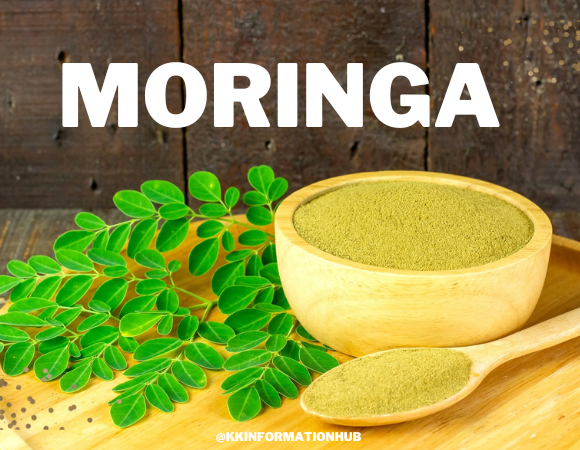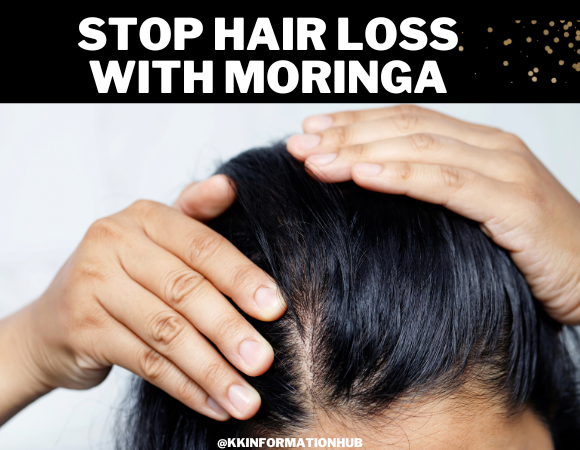What is Moringa?
Moringa is a plant that is native to the Himalayan region of India and is now widely cultivated in tropical and subtropical regions around the world. The leaves, pods, seeds, and bark of the moringa tree are all edible and are rich in nutrients, including vitamin C, calcium, and protein. Moringa is also used in traditional medicine to treat a variety of health conditions. Other names are "drumstick tree" or also known as "horseradish tree".
Moringa Leaves Vitamins and Minerals
Moringa is a nutrient-dense plant, and is particularly high in the following vitamins and minerals:
- Vitamin A: Moringa leaves are a rich source of beta-carotene, which the body converts into vitamin A. it is very helpful for healthy skin and also improves immune function.
- Vitamin C: Moringa leaves are also high in vitamin C, which is a powerful antioxidant that helps to protect cells from damage and supports the immune system.
- Calcium: Moringa leaves are a good source of calcium, which is essential for strong bones and teeth.
- Protein: Moringa leaves are a good source of plant-based protein, which is important for building and repairing tissues in the body.
- Iron: Moringa leaves are a good source of iron, which is important for the production of red blood cells and the transport of oxygen in the body.
- Potassium: Moringa leaves are a good source of potassium, which is important for regulating blood pressure and maintaining healthy heart function.
Other minerals found in moringa include zinc, magnesium, and manganese, which play a role in various bodily functions such as metabolism, wound healing, and maintaining a healthy immune system.
It's important to note that the nutrient content of moringa can vary depending on the growing conditions, processing methods, and storage conditions, so it is always best to buy moringa products from reputable sources.
Moringa Powder Health Benefits
Moringa Powder is believed to have a wide range of health benefits due to its high nutrient content. Some of the potential health benefits of moringa include:
- Anti-inflammatory properties: Moringa leaves contain compounds that have anti-inflammatory properties, which may help to reduce inflammation in the body and prevent chronic diseases such as heart disease and cancer.
- Antioxidant properties: Moringa leaves are high in antioxidants, which help to protect cells from damage caused by free radicals. This may help to prevent chronic diseases such as cancer and heart disease.
- Blood sugar regulation: Moringa leaves may help to regulate blood sugar levels in people with diabetes.
- Cardiovascular health: The anti-inflammatory and antioxidant properties of moringa may help to protect the heart and blood vessels, and may help to lower blood pressure and cholesterol levels.
- Cancer prevention: The antioxidants and anti-inflammatory compounds in moringa may help to protect cells from damage and prevent the development of cancer.
- Bone health: The high levels of calcium in moringa may be beneficial for bone health, and may help to prevent osteoporosis.
- Digestive health: Moringa leaves may help to promote healthy digestion and may help to prevent constipation and diarrhea.
- Weight loss: Moringa leaves are low in calories and high in nutrients, which may make them a beneficial addition to a weight loss diet.
It's important to note that more research is needed to confirm the health benefits of moringa and to understand the optimal dosage and use. As with any supplement, it is best to consult with a healthcare professional before adding moringa to your diet.
 |
| Moringa Leaves & Powder |
Moringa Powder Side Effects
Moringa is generally considered safe when consumed in moderate amounts as part of a healthy diet. However, Some potential side effects you must know about it:
- Allergic reactions: Some people may be allergic to moringa and may experience symptoms such as itching, rash, hives, and difficulty breathing.
- Blood thinning: Moringa leaves contain compounds that may affect blood clotting, so people taking blood thinners or who have a bleeding disorder should consult with their healthcare provider before consuming moringa.
- Low blood sugar: Moringa leaves may lower blood sugar levels, so people with diabetes should monitor their blood sugar levels closely when consuming moringa and consult with their healthcare provider.
- Interaction with medications: Moringa may interact with certain medications, such as blood thinners, so people taking medication should consult with their healthcare provider before consuming moringa.
- Pregnancy and breast-feeding: Moringa is not recommended for pregnant or breastfeeding women, as there is not enough information about its safety in these populations.
- Overdose: A large amount of moringa leaves may cause stomach upset and diarrhea
It is important to note that most of the studies on moringa have been done on animals, so more research is needed to understand the safety and potential side effects of consuming moringa in humans. As with any dietary supplement, it is best to consult with a healthcare professional before adding moringa to your diet.
Common Uses Of Moringa
Moringa can be consumed in a variety of ways, depending on the form in which it is available. Some popular ways to use moringa include:
- Moringa leaves: Fresh or dried moringa leaves can be eaten as a vegetable, either alone or in combination with other vegetables. Moringa leaves can be steamed, and they can be added to soups and stews. They can also be consumed as tea or added to smoothies.
- Moringa powder: Moringa powder is made by grinding dried moringa leaves and can be used as a dietary supplement. It can be added to smoothies, soups, stews, and sauces as a nutrient boost.
- Moringa capsules: Moringa capsules are made by filling empty capsules with moringa powder and are convenient for those who want to consume the supplement in an easy way.
- Moringa oil: Moringa oil is extracted from the seeds of the moringa tree and is commonly used in cosmetics and skincare products, as well as for cooking.
It is important to note that the nutrient content of moringa can vary depending on the growing conditions, processing methods, and storage conditions, so it is always best to buy moringa products from reputable sources. It is also important to consult with a healthcare professional before consuming moringa as a dietary supplement to make sure it is safe for you and to understand the optimal dosage.
How To Use Moringa For Joint Pain?
Moringa has anti-inflammatory properties and has been traditionally used to reduce joint pain, inflammation, and swelling. Here are some ways to use moringa to alleviate joint pain:
 |
| Moringa Powder can help to relieve joint pain |
- Moringa oil: Moringa oil can be applied topically to the affected joint. Massaging the oil gently into the skin can help to reduce pain and inflammation.
- Moringa powder or capsules: Moringa powder or capsules can be consumed orally as a dietary supplement. The anti-inflammatory compounds in moringa may help to reduce joint pain and inflammation when taken regularly.
- Moringa tea: Moringa leaves can be used to make tea. Drinking tea regularly may help to reduce joint pain and inflammation.
It is important to note that more research is needed to confirm the effectiveness of moringa for joint pain and to understand the optimal dosage. As with any supplement, it is best to consult with a healthcare professional before adding moringa to your diet, particularly if you are taking any medications or have any underlying health conditions.
Also, it's important to keep in mind that joint pain can have many causes, so it's best to consult with a healthcare professional to understand the underlying cause and determine the best course of treatment. Additionally, incorporating regular exercise, maintaining a healthy weight, and keeping the joints moving through gentle range-of-motion exercises can help to alleviate joint pain.
How To Use Moringa For Diabetes?
Moringa has been traditionally used to help regulate blood sugar levels and may be beneficial for people with diabetes. Here are some ways to use moringa to help manage diabetes:
- Moringa leaves: Fresh or dried moringa leaves can be eaten as a vegetable, either alone or in combination with other vegetables. . They can also be consumed as tea or added to smoothies.
- Moringa powder: Moringa powder can be added to smoothies, soups, stews, and sauces as a nutrient boost. It can also be consumed as a dietary supplement.
- Moringa capsules: Moringa capsules are made by filling empty capsules with moringa powder and are convenient for those who want to consume the supplement in an easy way.
It's important to note that more research is needed to confirm the effectiveness of moringa in managing diabetes and to understand the optimal dosage. It is also important to monitor blood sugar levels closely when consuming moringa, particularly if you have diabetes and are taking medication to control blood sugar levels. It is always best to consult with a healthcare professional before adding moringa to your diet, especially if you have diabetes or any other health condition.
Managing diabetes also requires a balanced diet and regular physical activity, as well as keeping track of blood sugar levels and taking medication as prescribed by a healthcare professional.
Moringa Skin Benefits & User Guide
Moringa oil is rich in antioxidants, vitamins, and minerals that may be beneficial for the skin. The oil is believed to help nourish and protect the skin, making it look and feel healthier. Some of the potential benefits of moringa oil for the skin include:
- Moisturizing: Moringa oil is rich in fatty acids that can help to moisturize and hydrate the skin, making it look and feel softer and smoother.
- Anti-aging: The antioxidants and anti-inflammatory compounds in moringa oil may help to reduce the appearance of fine lines and wrinkles, and may help to prevent premature aging of the skin.
- Brightening: Moringa oil may help to brighten the skin and even out skin tone, due to the presence of antioxidants and vitamins.
- Acne: Moringa oil is non-comedogenic, it does not clog pores, and it may help to reduce the appearance of acne and other skin blemishes.
- Sun protection: Moringa oil contains compounds that may provide some protection against sun damage. However, it is not recommended to use moringa oil as sole sun protection, it should be combined with other sun protection measures such as sunscreen.
Moringa oil can be used topically by applying it directly to the skin. It can be used as a moisturizer, added to lotions or creams, or used as a carrier oil for essential oils. It's always best to do a patch test before applying moringa oil to the skin to ensure that you are not allergic to the oil. Also, it's important to keep in mind that using moringa oil alone may not be sufficient to improve the skin, a healthy diet, and lifestyle, and appropriate skincare routine are also important for maintaining healthy skin.
Moringa Hair Benefits & User Guide
Moringa oil is also believed to be beneficial for hair health due to its high nutrient content. Some of the potential benefits of moringa oil for hair include:
- Moisturizing: Moringa oil is rich in fatty acids that can help to moisturize and hydrate the hair, making it look and feel softer and smoother.
- Strengthening: Moringa oil is rich in antioxidants and minerals that can help to strengthen the hair and reduce hair breakage.
- Promoting hair growth: Moringa oil may help to promote hair growth by nourishing the hair follicles and providing the hair with the necessary nutrients.
- Dandruff and scalp health: Moringa oil is also believed to help with dandruff and other scalp issues. It is known to be antimicrobial, which can help to reduce scalp infections, dryness, and itching.
 |
| Moringa Can Improve Hair Health |
Moringa oil can be used to massage the scalp, as a pre-shampoo treatment, or added to conditioners or hair masks. It's always best to do a patch test before applying moringa oil to the scalp to ensure that you are not allergic to the oil. It's also important to note that while moringa oil can be beneficial for hair health, a healthy diet and lifestyle, and an appropriate hair care routine are also important for maintaining healthy hair.
Which Age Group Can Use Moringa?
Moringa is considered safe for most people when consumed in moderate amounts as part of a healthy diet. However, as with any dietary supplement, it is best to consult with a healthcare professional before adding moringa to your diet, especially if you have any underlying health conditions or are taking any medications.
Moringa leaves, powder, and oil is considered safe for consumption by adults. Pregnant and breastfeeding women should not consume moringa, as there is not enough information about its safety in these populations.
For children, moringa is considered safe for consumption under the supervision of a healthcare professional as there is limited research on the safety of moringa for children. A healthcare professional will be able to determine the appropriate dosage and usage for children based on their age, weight, and overall health.
It's also important to note that consuming moringa in high amounts may cause stomach upset and diarrhea, and in rare cases, allergic reactions.
Conclusion :
Moringa is a nutrient-dense plant that has been traditionally used for various health benefits. Its leaves, pods, seeds, and bark are all edible and are rich in nutrients such as vitamin C, calcium, and protein. Moringa has been traditionally used to reduce joint pain, inflammation, and swelling, and to regulate blood sugar levels in people with diabetes.
Moringa can be consumed in various forms such as leaves, powder, oil, and capsules. It can be added to smoothies, soups, stews, and sauces, or used topically as a moisturizer or oil. It's also believed to be beneficial for skin and hair health.
It's important to note that while moringa is generally considered safe when consumed in moderate amounts, more research is needed to confirm the health benefits of moringa and to understand the optimal dosage and use. Also, pregnant and breastfeeding women should not consume moringa, and it's always best to consult with a healthcare professional before adding moringa to your diet, especially if you have any underlying health conditions or are taking any medications.







0 Comments
Please do not enter any spam link in the comment box.